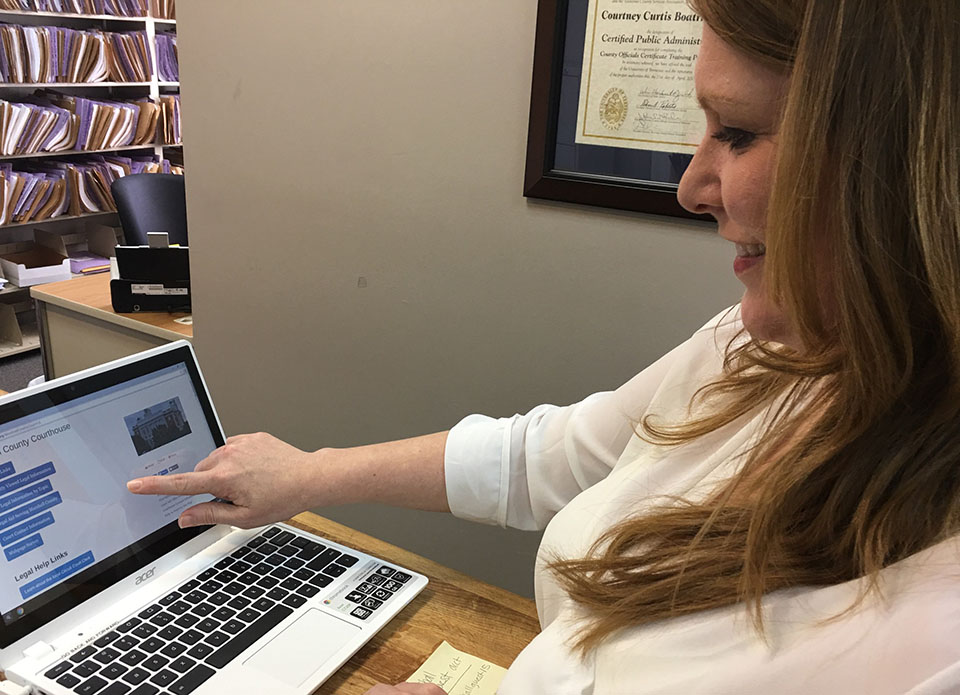Self-represented litigants in eight Tennessee counties will soon be able to enjoy convenient access to valuable legal information and resources thanks to a series of grants provided by the Tennessee Supreme Court and the Administrative Office of the Courts. The grants will cover the expense of purchasing and installing special kiosks in courthouses throughout the state.
The kiosks will connect self-represented civil litigants with a variety of tools they can use to better navigate the legal system, including information about legal aid offices, pro bono projects, court-approved documents, and more. Courthouse visitors will access these resources via an onsite computer or tablet.
The initiative, piloted by the Tennessee Supreme Court Access to Justice Commission, seeks to address a prevalent issue in the state.
“A lack of legal representation is a problem that affects too many Tennesseans,” Tennessee Supreme Court Justice Cornelia Clark said. “While defendants in most criminal cases are guaranteed a lawyer, the same is not true for those who find themselves involved in civil cases. Often these cases deal with serious issues related to a person’s health and well-being, which makes it especially important that litigants are aware of the legal resources available to them. I am both proud and excited that the Tennessee Supreme Court Access to Justice Commission has recently taken meaningful action to help mitigate this problem in the form of the court kiosk project.”
So far, the AOC has announced eight counties that will receive funding to launch the kiosks over the next year. These counties were selected through an application process. Courthouses in the following counties will receive grants:
Anderson County
Blount County
Dickson County
Hamilton County
Hawkins County
Knox County
Shelby County
Sullivan County
At a later date, the AOC will announce two more counties that will receive funding for kiosks.
Each kiosk will be customized for the particular county. All kiosks, though, will provide information based on the Help4TN.org platform, which was developed by the Tennessee Alliance for Legal Services and West Tennessee Legal Services. Help4TN.org serves as a storehouse of legal resources for self-represented litigants, offering educational materials related to a variety of subjects such as renters’ rights and child support, to name just a few.
The inspiration for the kiosk project came from the Access to Justice Public Awareness Subcommittee. General Sessions Judge Lee Bussart was on that committee and had grown concerned about the number of people she regularly saw in her courthouse in Marshall County who were in need of legal advice but were not represented by an attorney. On some days, as many as 400 people stream into the courthouse.
“They ask the clerks so many questions, and I get a lot of questions in court: ‘What do I do, what do I do?’” Judge Bussart said. “And, I think it’s a bad advertisement for our system to just say to those people, ‘I can’t help you.’”
As a judge, she is not allowed to give legal advice to pro se litigants, and clerks cannot offer advice either because they are not attorneys. Judge Bussart decided it would be a good idea to try to help those litigants find free, reliable information online that could be of use to them.
“I’ve seen a lot of people pay for bad advice, and it was important to me to…not give them junk and not make them pay for junk,” Judge Bussart said.
Building off of that idea, she convinced the Marshall County Bar Association to purchase a Chromebook for self-represented litigants to consult when they came to the courthouse. The Chromebook opens to a page designed to resemble Help4TN.org. From that page, litigants can find links to a number of free resources offering legal aid. The Marshall County Bar Association won a “most innovative program” award from the American Bar Association for its efforts.
The money for the kiosk grants came from both the Administrative Office of the Court’s technology fund and from excess funding collected as a part of the Supreme Court’s continuing legal education efforts.
The Tennessee Supreme Court’s Access to Justice Commission was formed in 2009 as part of the Court’s Access to Justice Initiative. That initiative is dedicated to meeting the legal needs of the many Tennesseans each year who are confronted with legal problems that they may not have the expertise or the means to adequately address.
More information about the Access to Justice Initiative is available on its website: justiceforalltn.com

